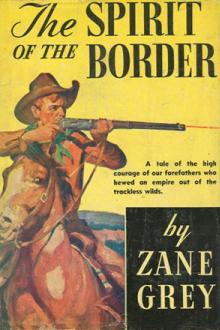The U. P. Trail, Zane Grey [robert munsch read aloud .txt] 📗

- Author: Zane Grey
Book online «The U. P. Trail, Zane Grey [robert munsch read aloud .txt] 📗». Author Zane Grey
General Lodge’s stern face relaxed, but he spoke firmly. “Obey orders,” he admonished Larry King.
The loop was taken from Larry’s waist and transferred to Neale’s. Then all was made ready to let the daring surveyor with his instrument down over the wall.
Neale took one more look at the rugged front of the cliff. When he straightened up the ruddy bronze had left his face.
“There’s a bulge of rock. I can’t see what’s below it,” he said. “No use for signals. I’ll go down the length of the rope and trust to find a footing. I can’t be hauled up.”
They all conceded this silently.
Then Neale sat down, let his legs dangle over the wall, firmly grasped his instrument, and said to the troopers who held the rope, “All right!”
They lowered him foot by foot.
It was windy and the dust blew up from under the wall. Black cañon swifts, like swallows, darted out with rustling wings, uttering frightened twitterings. The engineers leaned over, watching Neale’s progress. Larry King did not look over the precipice. He watched the slowly slipping rope as knot by knot it passed over. It fascinated him.
“He’s reached the bulge of rock,” called Baxter, craning his neck.
“There, he’s down—out of sight!” exclaimed Henney.
Casey, the flagman, leaned farther out than any other. “Phwat a dom’ sthrange way to build a railroad, I sez,” he remarked.
The gorge lay asleep in the westering sun, silent, full of blue haze. Seen from this height, far above the break where the engineers had first halted, it had the dignity and dimensions of a cañon. Its walls had begun to change color in the sunset light.
Foot by foot the soldiers let the rope slip, until probably two hundred had been let out, and there were scarcely a hundred feet left. By this time all that part of the cable which had been made of lassoes had passed over; the remainder consisted of pieces of worn and knotted and frayed rope, at which the engineers began to gaze fearfully.
“I don’t like this,” said Henney, nervously. “Neale surely ought to have found a ledge or bench or slope by now.”
Instinctively the soldiers held back, reluctantly yielding inches where before they had slacked away feet. But intent as was their gaze, it could not rival that of the cowboy.
“Hold!” he yelled, suddenly pointing to where the strained rope curved over the edge of the wall.
The troopers held hard. The rope ceased to pay out. The strain seemed to increase. Larry King pointed with a lean hand.
“It’s a-goin’ to break!”
His voice, hoarse and swift, checked the forward movement of the engineers. He plunged to his knees before the rope and reached clutchingly, as if he wanted to grasp it, yet dared not.
“Ropes was my job! Old an’ rotten! It’s breakin’!”
Even as he spoke the rope snapped. The troopers, thrown off their balance, fell backward. Baxter groaned; Boone and Henney cried out in horror; General Lodge stood aghast, dazed. Then they all froze rigid in the position of intense listening.
A dull sound puffed up from the gorge, a low crash, then a slow-rising roar and rattle of sliding earth and rock. It diminished and ceased with the hollow cracking of stone against stone.
Casey broke the silence among the listening men with a curse. Larry Red King rose from his knees, holding the end of the snapped rope, which he threw from him with passionate violence. Then with action just as violent he unbuckled his belt and pulled it tighter and buckled it again. His eyes were blazing with blue lightning; they seemed to accuse the agitated engineers of deliberate murder. But he turned away without speaking and hurried along the edge of the gorge, evidently searching for a place to go down.
General Lodge ordered the troopers to follow King and if possible recover Neale’s body.
“That lad had a future,” said old Henney, sadly. “We’ll miss him.”
Boone’s face expressed sickness and horror.
Baxter choked. “Too bad!” he murmured, “but what’s to be done?”
The chief engineer looked away down the shadowy gorge where the sun was burning the ramparts red. To have command of men was hard, bitter. Death stalked with his orders. He foresaw that the building of this railroad was to resemble the war in which he had sent so many lads and men to bloody graves.
The engineers descended the long slope and returned to camp, a mile down the narrow valley. Fires were blazing; columns of smoke were curling aloft; the merry song and reckless laugh of soldiers were ringing out, so clear in the still air; horses were neighing and stamping.
Colonel Dillon reported to General Lodge that one of the scouts had sighted a large band of Sioux Indians encamped in a valley not far distant. This tribe had gone on the war-path and had begun to harass the engineers. Neale’s tragic fate was forgotten in the apprehension of what might happen when the Sioux discovered the significance of that surveying expedition.
“The Sioux could make the building of the U. P. impossible,” said Henney, always nervous and pessimistic.
“No Indians—nothing can stop us!” declared his chief.
The troopers sent to follow Larry King came back to camp, saying that they had lost him and that they could not find any place where it was possible to get down into that gorge.
In the morning Larry King had not returned.
Detachments of troopers were sent in different directions to try again. And the engineers went out once more to attack their problem. Success did not attend the efforts of either party, and at sunset, when all had wearily returned to camp, Larry King was still absent. Then he was given up for lost.
But before dark the tall cowboy limped into camp, dusty and torn, carrying Neale’s long tripod and surveying instrument. It looked the worse for a fall, but apparently was not badly damaged. King did not give the troopers any satisfaction. Limping on to the tents of the engineers, he set down the instrument and called. Boone was the first to come out, and his summons brought Henney, Baxter, and the younger members of the corps. General Lodge, sitting at his campfire some rods away, and bending over his drawings, did not see King’s arrival.
No one detected any difference in the cowboy, except that he limped. Slow, cool, careless he was, yet somehow vital and impelling. “Wal, we run the line around—four miles up the gorge whar the crossin’ is easy. Only ninety-foot grade to the mile.”
The engineers looked at him as if he were crazy.
“But Neale! He fell—he’s dead!” exclaimed





Comments (0)